Dulhan ek raat ki: is tragedy more beautiful than comedy?
Publié le 20 Juin 2010
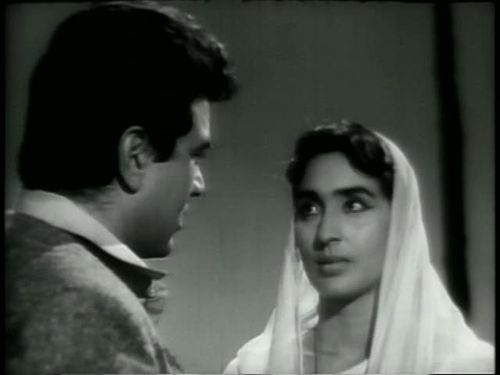
What do you prefer? A happy ending where the two lovers unite after having defeated the villains or convinced their parents? Or the sad one where love cannot exist because the tragic and beautiful story doesn’t permit it? DDLJ or Devdas? KKHH or Fanaa? Many people would of course favour a happy ending, because life is a sad enough tale as it is, so why shouldn’t one dream and unwind at the cinema? Isn’t that what movies are for? We all know films aren’t reality, and most of us are idealists who love to be charmed by beautiful stories where love is not only possible, but victorious, and can last… forever. Besides, movies show us beautiful people in beautiful settings, and what we cannot afford for ourselves is there, on the screen, ready for us to suspend our disbelief, and be lulled by an optimistic tale, full of hope and glory, signifying plenty!
There’s nothing better, isn't there, than being tormented during two and a half hours by doubt and anguish, before finally being given the incredibly relieving possibility that love will happen, and the situation satisfies everyone. We get such a feeling of justice too, when this happens: we know that love is the best and most natural thing that can happen to anyone, and so being denied that fullness is unfair and painful. A good director will enable this type of story to unfold: a realistic difficulty stops happiness from pursuing its quiet glory, and the lovers go through the pangs of bereavement and doubt: the best distances are those that could separate them from each other, the psychological ones, or the moral ones. Of course a family obstacle will do fine, because the conflict of interests generally works very well. And so if two loves oppose one another, you have the perfect entertainer!
Dulhan ek raat ki (The one-night bride, by D.D.Kashyap, 1967) isn’t that, alas! We do have the difficulties, we do have the love, but the events are too overwhelming, and the end is tragic, even if Memsaab thinks (or rather hopes) otherwise! Here’s what she writes, at the end of a very honest description of the film:
“Although to my delight the ending was not quite as dark as the book’s, even if I wouldn’t call it happy. Still, there’s enough ambiguity so that I can pretend.”
So first go to her blog for the story (thanks Greta), and then come back.
You’re done? OK, so let’s get down to business: Thomas Hardy’s Tess is a masterpiece of English literature, and D.D. Kashyap deserves praise for having attempted to adapt it. The question is, then, has he done well to keep it a tragedy, or should he have softened it down? Well, he’s done both! We have one the one hand his overall faithfulness to the original story, with remarkable inventiveness to pass from the XIXth century Wessex environment to mid XXth century Uttar Akhand, and at the same time some completely new elements which introduce a charming comedy spirit that doesn’t disturb the main course of events.
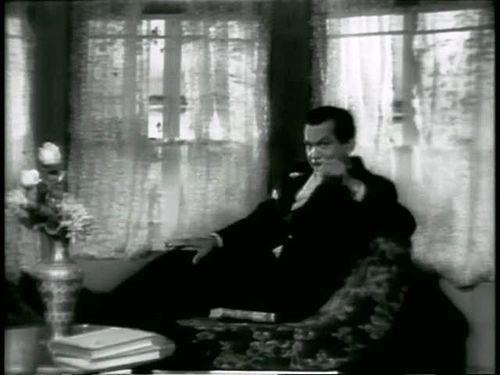
Johnny Walker is the main ingredient of that dose of comedy. He’s introduced in a very clever (and rare) way: he see him turning his back the camera, and then suddenly without any preparation, he faces us spectators, whereas we didn’t know before we were in the movie! And he delivers us this funny stance about his taking advantage of bachelors’ residences until they get married, and he has then to find another victim! Later he’s the agent of reconciliation between Nirmala and Ashok, or he tries at least, reminding his friend that the young lady is unjustly abandoned, and Ashok gains in humanity, because we understand his sorrow much more easily than we do Angel’s in the novel. In the film, it doesn’t seem that Ashok leaves his beloved for so very long, but Angel actually leaves Tess to sail to South America, and stays there a number of years! She writes to him, and all her letters are unanswered. Desperate, she goes back to the one man who had insisted would look after her in time of need, Alec, her rapist. But Hardy’s book (and Roman Polanski’s film) make it clear that Alec, even if he’s “a bad sort”, remains human, and is genuinely concerned by Tess in his own way. Angel’s wounded manhood on the other hand destroys her. Ashok doesn’t get that treatment, and as a result, perhaps, Dharmendra’s character comes out as more gentle, but a little weak.
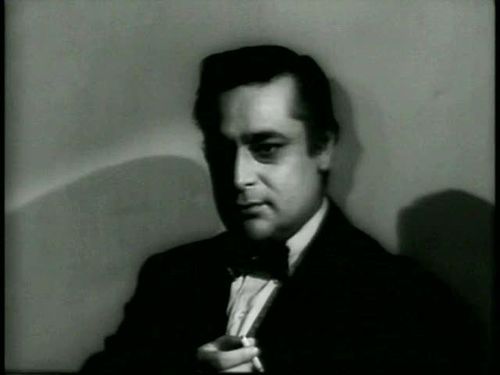
The same thing happens to Rehman’s character, Ranjeet, who impersonates Alec. Well, not quite, thanks to the movie’s photographer. Rehman’s brow and jaws are perfectly shadowed (remember his pose during the piano bit “Kai din se di”?) to bring out his sombre purposes, and if he doesn’t achieve much in terms of acting, it doesn’t disturb the movie too much. What it does is it boosts its simple balance of right and wrong, a thing which (am I right?) Indian audiences would prefer. For example, there’s this moment when, at the end of the movie, he tries to explain to a solitary Nirmala that he’s truly reformed, that he needs her, that he’s not really responsible for what has happened that raat… But he doesn’t look at her! And when he does, it’s with a hard and frightening stare. He just recites his text, in a doggedly way that lacks all passion. If he had wanted to prove at least his care for her, wouldn’t he have tried to soften her, to make her pity him? Instead, she finds in his speech a confirmation of his evil ways, and triumphs. Thomas Hardy knew more about human complexity.
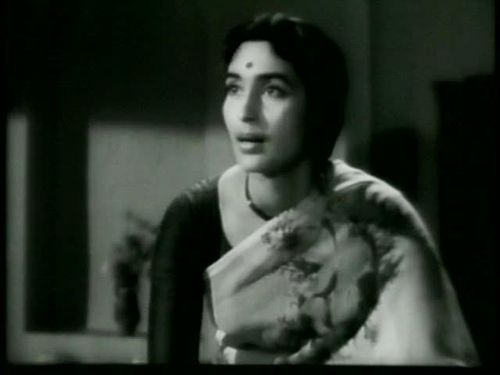
Nutan on the contrary shines through and through (much to the pleasure of the Nutan fan:-)))!!) and not only in the expected forlorn scenes of solitude and dejection. I say expected, because she’s obviously been used by directors in a number of movies where she had to deal with social rejection (see Sujata, Saudagar or Bandini!) In Dulhan ek raat ki, there’s a very moving scene, where she sings Madan Mohan’s “sapno me agar mere”, and one is rapturously watching her painful desire (her foot brushes against the bedstead, a hand strokes the pillow). She’s languidly reclining on the bed, and turns over to reveal her perfect face. The scene is full of wrenching and disturbing yearning; her dark eyes look straight at the camera for a second, and one feels she’s making us sense what’s going on within her breast. In her song, she’s woefully wishing her saajan (her lover) to come in her dreams, so she might sleep: without him, she cannot rest, but should he visit her dreams, she will find comfort and repose. The words are ominous, because we know the ending, and the sleep she’s referring to could anticipate the unfortunate destiny that will befall her. They can also be interpreted in a rather frank sexual way, because of the cruder meaning of “sleeping”. But all this is never shocking: she’s expressing the distress of bereaved love, and everything she says is beautiful and natural.
On the whole her role is a rather grave one, even before the fateful night. Once only is she again the marvel of mirth and happiness which I love so much (see Dilli ka thug, for example): it’s when she arrives at the Nainital “school” where she gets employment as governess. The “headmaster” asks her about her experience, and the mention of children bring on her face the loveliest of expressions:
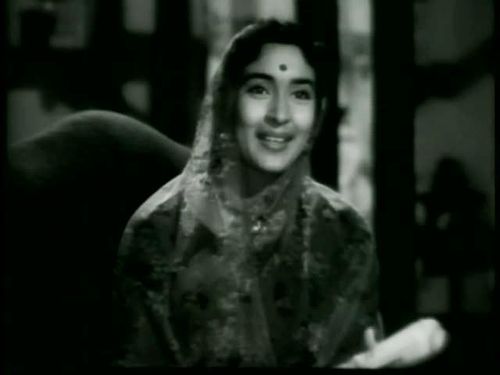
She then defends their naughtiness, saying it’s really liveliness, and that a home isn’t one without it. This scene doesn’t exist in the book; Tess doesn’t find employment after Angel has left her, that’s why she goes to Alec. Perhaps DD Kashyap introduces this scene out of pity for Tess/Nirmala! There is also a very witty and Nutan-indulging invention, which I hadn’t seen done before: during her stay there, she writes to her mother, telling her that everything is Okay, that she doesn’t need to worry any more about her. As is common, we hear her voice when Maa reads, but we get a whooper: Nutan herself, on her bed in her room, speaking the words which her mother is reading back home! Now that’s good, because the scene supposes that she had been meditating the words, and memorised them perhaps, before writing them down, showing us her tender love for her mother. It’s also a way to enjoy her beauty once more, as she experiences that delicate feeling.
Talking of art and beauty, the dramatic night scene where the catastrophe happens deserves a word. Rehman and Nutan are side by side in the car, he’s impassively taking away from home, and the moonlight passes on their faces, overshadowed now and then by darkness. Nutan’s face is rimmed by a spectacular oval of classic beauty, where her black features stand out in striking contrast. She’s tense, and then angry when she realises he’s taking her out of her way, but it’s too late, we see him clutching her arm, she pulls it away, banging it on the window (and losing the bangle which Ashok had asked her to keep to remember him by), and then we see but one picture:
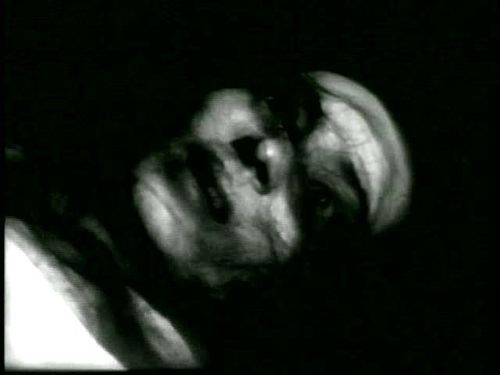
It lasts two seconds, perhaps, or two seconds and a half, and we understand that this distraught face is after; this is much more powerful than what we see in Polanski’s film, where the rape is practically shown. The blank in the narration here (and the dishevelled hair striping her eyes like whips) evokes the gaping hole in her life which this night will leave forever in her, and one is left to ponder about the meaning of all this. In today’s society (at least in the West), women would tend to heal part of such a trauma thanks to a lawsuit and condemnation of the rapist. But are we right to give such an importance to virginity? Or can we avoid giving it all that importance? Thomas Hardy’s Tess clearly denounces such a male-oriented emphasis. Of course we’re talking about rape here, not the loss of virginity. But in fact the story is an exploration of the social and psychological impact of this loss. Tess/Nirmala is raped, but it is shown (socially) to be as bad as if she’d been consenting. As it is, she suffers double, that’s all. But perhaps if virginity hadn’t been so essential in the culture of the time, she would have suffered only from the violence of the rape, and not from the factual loss of her virginity.
Nevertheless the Indian version of the movie seems to insist on the importance of virginity too. Ashok even hints Nirmala could have stopped working at Ranjeet’s place once she had felt his interest for her. Women are attracted to such men he says. I don’t quite know what to think about this! And the movie’s end, Nirmala blames the “powers” above which, as in Greek tragedies, play with simple mortals (cf. Shakespeare’s King Lear, act IV, sc 1) and “kill them for their sport”. But we know that such powers have a human face, the face of ignorance and bigotry, which turn women into the victims of their sex, which jealous men want to possess more than enjoy and protect.
One has to look at the position of men too, and even if today, the value traditionally given to virginity is more limited in secular societies, because of the freedom given to women, such places are an exception in the world, and we cannot affirm, I think, that all societies that cherish virginity are systematically male-dominated ones. There is something to say for the deeply rooted need of a man to be the sole “owner” of his wife, and Ashok’s reaction is therefore understandable, even if he knows that Nirmala is innocent. In Thomas Hardy’s original story, the reaction takes a cruel turn which is excessive, but it seems that Ashok suffers not unjustifiably.
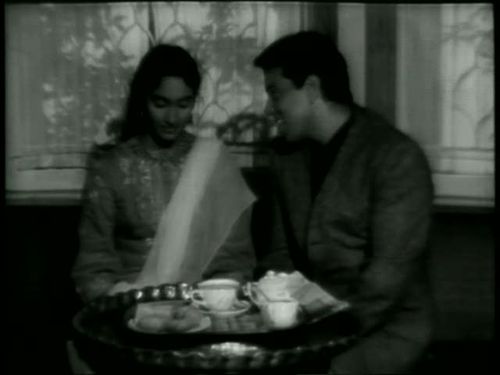
To come back to my question at the beginning, is Dulhan ek raat ki more artistically satisfying because it’s a tragedy (it is a tragedy, cf. the numerous references to kismet, fate), or could one have changed the end and make the lovers unite somehow? Difficult, huh? Aren’t love stories “greater” if they contain some elements of sadness? Of course, if the end is sad, or even tragic, the whole movie is tainted by it. But I know of a movie which has succeeded the tour de force of including the ingredient of sadness and yet avoid making the spectator feel he’s been cheated: it’s Veer-Zaara. Yash Chopra has created a love-story in which the experience of loss and sadness weighs down the general impression, and yet the lovers reunite in the end in spite of all the difficulties, and the relief and wonder at the truth of love is all the stronger because they have been deprived of their youth, which is the magic and memory of love. Yet love happens, it is given to them, and not denied them. And somehow, through love (it’s the meaning of that last song-scene, “Tere liye” in which we see the two old lovers become young again), they regain a youth which is like an eternity!
In Dulhan ek raat ki, on the other hand, as in Devdas and other sad-ending movies, the beauty has to come from somewhere else, and that somewhere is perhaps the certainty that love is stronger than death, that it triumphs over death precisely because it fights against it (and sometimes it rushes towards it) so impetuously. Love has something to do with death, in its absoluteness: that’s the “solution” to tragic romances. And real (classic) romanticism is always connected to death. Today people would call such movies as Tess unromantic, because of the drama contained in it. If it doesn’t enable love to flourish, it isn’t “romantic”. But the true meaning of “romantic” is passionate until death. True love contains an excess, a sense of sacrifice, and a rebellion against the limits of our human condition which is best shown in tragedy. Romantic comedies can be beautiful and satisfying, but artistically, romantic dramas can explore this dimension better.
One last remark concerning the incredibly rich and plentiful musical score: I sometimes felt that the film contained more music than talking! The songs aren’t all standard length, too, which creates a very pleasant and free relationship to the genre. It’s as if the film-maker had mastered the necessity of giving songs to his spectators, and knew how best to surprise them by offering them “classic” pieces (yet always beautifully blended in the storyline) and then unexpected extras that spring out of his inspiration when we don’t expect them.
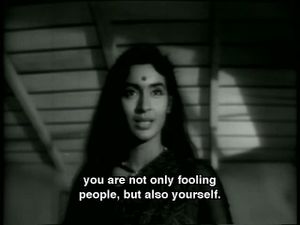
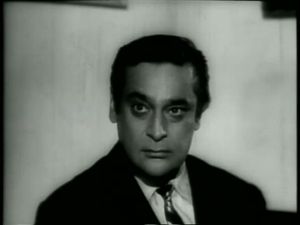
Here is a link to some more pictures of the movie!
/image%2F1489169%2F20200220%2Fob_9722d6_banner-11.JPG)